#old English
Explore tagged Tumblr posts
Text

Girles were children
The ancestor of the word girl meant 'child of any gender'. Its meaning narrowed to 'young female human' during the Middle English period. The meanings of words change over time. This is called semantic drift. Click my new graphic below to have a closer look at five examples of narrowing. Tomorrow we'll dive into the opposite semantic change: widening.
#historical linguistics#linguistics#language#etymology#english#lingblr#proto-germanic#middle english#old english#german#dutch#swedish#norwegian#danish#icelandic#frisian#afrikaans
291 notes
·
View notes
Text
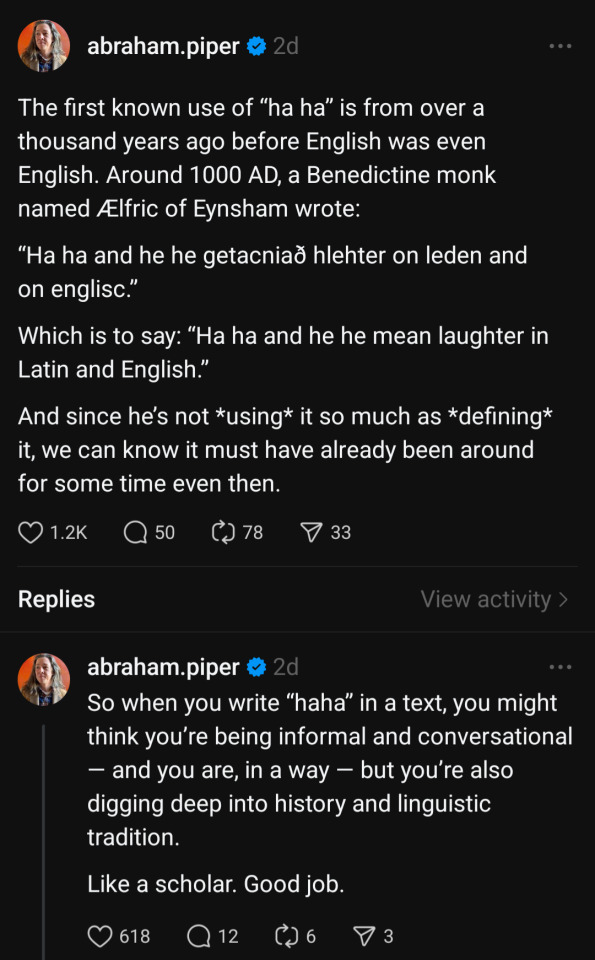
13K notes
·
View notes
Text
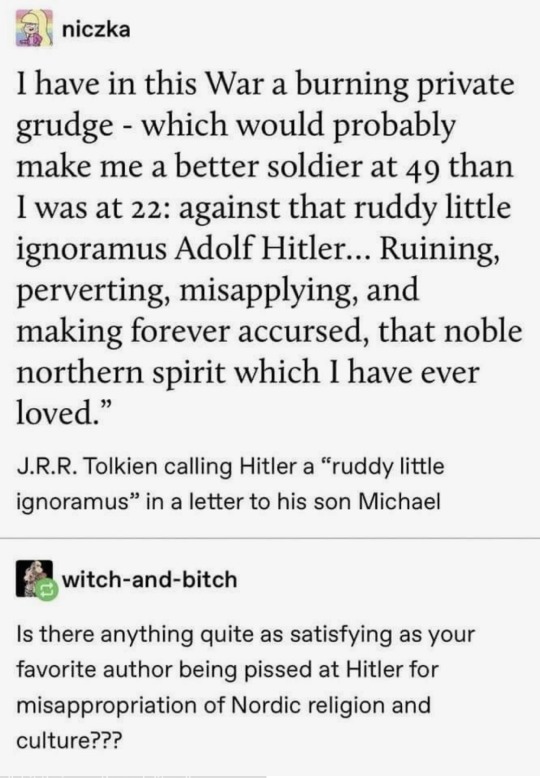
On the topic of fascists appropriating ancient Germanic culture.
#ruddy little ignoramus#antifascism#jrr tolkien#norse mythology#tolkien#scandinavian mythology#germanic mythology#germanic paganism#old norse#paganism#asatru#vikings#viking mythology#viking#viking history#anglo saxon#old english
320 notes
·
View notes
Text
By the way! BBC Merlin, in its ongoing quest to achieve ren faire levels of historical accuracy, used Actual Old English as the magic spell language. They got a professor to do a lot of the translations, though they didn't spend much effort on the pronunciation.
There are two ways that this is very funny if you watch the show while knowing OE. One is that usually when they do the "wave your hands to smash your enemies around" type spells they're literally saying very simple stuff like "jump back" and "fall." The other is that whenever they have a long incantation to read, they say vaguely related stuff for a sentence or so and then just transition into reciting Beowulf.
11K notes
·
View notes
Text
I love when I see a post saying “WHEREFORE ART THOU [insert name of a missing person],” while my Old English nerd ass knows that their usage of the phrase is completely wrong.
Quick history lesson:
“Wherefore art thou Romeo” is a well known phrase from William Shakespeare’s play Romeo and Juliet (obviously). During the time period it was written, the term “wherefore” meant “why.” The line right after this one is “deny thy father and refuse thy name.” In the play, Juliet’s family (Capulets) are an enemy of Romeo’s family (Montagues). Here, Juliet is asking Romeo why he must be a Montague. Not where he is.
So next time you guys are about to say “Wherefore art thou [insert name of a missing person],” remember that you’re not asking where this missing person is; you’re really asking “why are you [insert name of a missing person].”
Thank you for coming to my Nerd Talk. *Mic drop*
#romeo and juliet#shakespeare#william shakespeare#poetry#plays#wherefore art thou#old english#writing#nerds
176 notes
·
View notes
Text
Shivelight (n.) — an eye-catching and poetic word used to describe the slender, golden ribbons of light that stream through the canopy of leaves—sunlight pierced and filtered by the gentle shifting of leaves. It captures the stillness of a wooded morning, the quiet revelation of illumination dancing between shadows.
2K notes
·
View notes
Text
Had to fill out a new form for my psychiatrist's office recently -- pretty standard stuff, including a drop-down for race/ethnicity and another for primary language.
But when I entered "english" in the Primary Language search bar as requested, it offered me some amazing, exciting options.
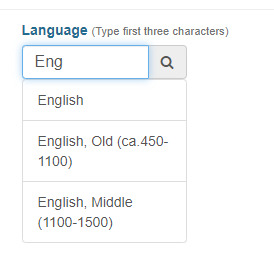
[ID: A screengrab of the form, where I have typed "eng" in the search bar; three options are visible below. The options are "English", "English, Old 450-1100" and "English, Middle 1100-1500".]
I know it's just because the form autoloaded a preset list of languages from somewhere that included Old and Middle English, but I'm still tickled by the idea that Clarity Clinic Chicago has people onboard who could prescribe Adderall for Caedmon or help Shakespeare sort out his gender issues.
4K notes
·
View notes
Text
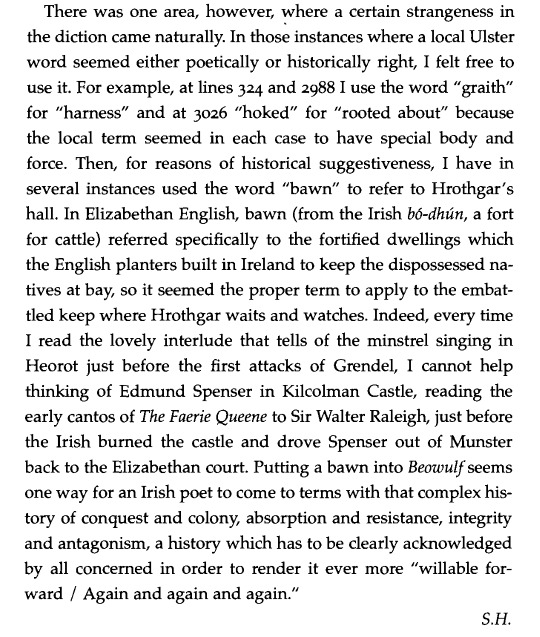
- Seamus Heaney on Irish history and recontextualization in his translator's note, from Beowulf: A New Verse Translation
#quotes#classics#classic literature#beowulf#seamus heaney#poetry#irish literature#irish history#irish poetry#irish authors#old english#epic poetry#mythology#translation#colonialism#literature#books#studyblr#litblr#academia
76 notes
·
View notes
Text
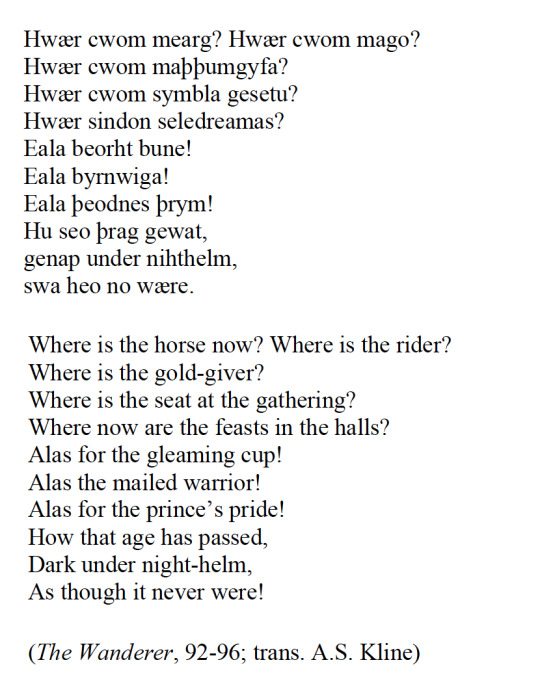

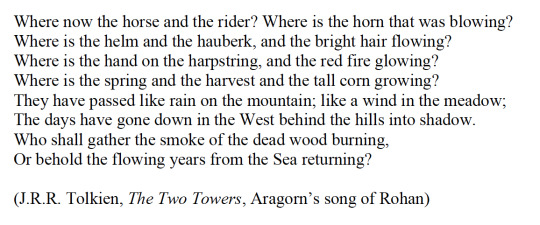
i. The Wanderer (anonymous Old English poem ca. 9th-10th century; trans. A.S. Kline)
ii. Maffeo Vegio, Book XIII of the Aeneid, 1428, trans. Michael Putnam
iii. J.R.R. Tolkien, The Two Towers, 1954
3K notes
·
View notes
Text
Some Old English Words
Elflock
Late 1500s
A lock of hair that looks as though it’s been tangled by elves.
In old folklore, elflocks (or fairy locks) were said to be the result of fairies or elves knotting the hair of sleeping children as they played in it during the night.
Concupiscible
15th century
Means “worthy of being desired.”
Betwixt
Means “between.”
An Old English word; first recorded before the year 950.
Brabble
Means “to argue stubbornly about trifles.”
It was first recorded in English in the late 1400s.
Comes from the Dutch brabbelen, meaning “to quarrel, jabber.”
Mickle
Means “great; large; much.”
Can refer to something that’s large in size, like a mickle storm.
But it can also refer to a great amount of something.
Bookcraft
Means “literary skill; authorship.”
It’s an archaic noun used to talk about great talents with storytelling and the written word.
Appeared in English before the year 900.
Brainish
First recorded in the 1520s.
Means “impetuous, headstrong.”
Unfriend
Unfriend isn’t just a social media term.
Its use in English actually dates back to the 1200s when it was used as a noun to refer to an enemy: The opposite of a friend is an unfriend.
Constellate
Means “to cluster together, as stars in a constellation.”
First appeared in English between 1615 and 1625.
NOTE
The phrase “old English”can mean two different things.
There’s the official term Old English, which refers specifically to the English spoken between 450 and 1150.
But there’s also old English—as in words that are considered really old because they first appeared in the 1300s, 1400s, and beyond.
There are dozens of English words that were first recorded in centuries past and then fell out of favor.
Not every word survives the passage of time, above is a mix of Old English and just plain old English words for your next poem/story.
Source ⚜ More: Notes & References ⚜ Writing Resources PDFs
#old english#langblr#words#writeblr#writing reference#literature#writers on tumblr#dark academia#spilled ink#writing prompt#poets on tumblr#creative writing#writing inspiration#light academia#writing ideas#lit#writing resources
184 notes
·
View notes
Text
Old Welsh lit: Dave punched Steve. This incurred a fine of twelve cattle and a nine-inch rod of silver and is known as one of the Three Mildly Annoying Blows of the Isle of Britain
Old Irish lit: Dave punched Steve so that the top of his skull came out of his chin, and gore flooded the house, and he drove his fists down the street performing his battle-feats so that the corpses were so numerous there was no room for them to fall down. It was like “the fox among the hens” and “the oncoming tide” and “that time Emily had eight drinks when we all know she should stop at six”
Old English lit: Dave, the hard man, the fierce man, the fist-man, gave Steve such a blow the like has not been seen since the feud between the Hylfings and the Wends. Thus it is rightly said that violence only begets more violence, unless of course it is particularly sicknasty. Amen.
30K notes
·
View notes
Text
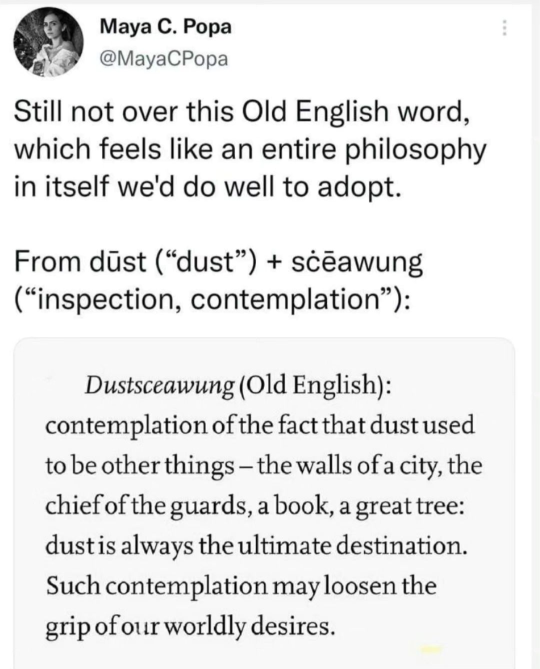
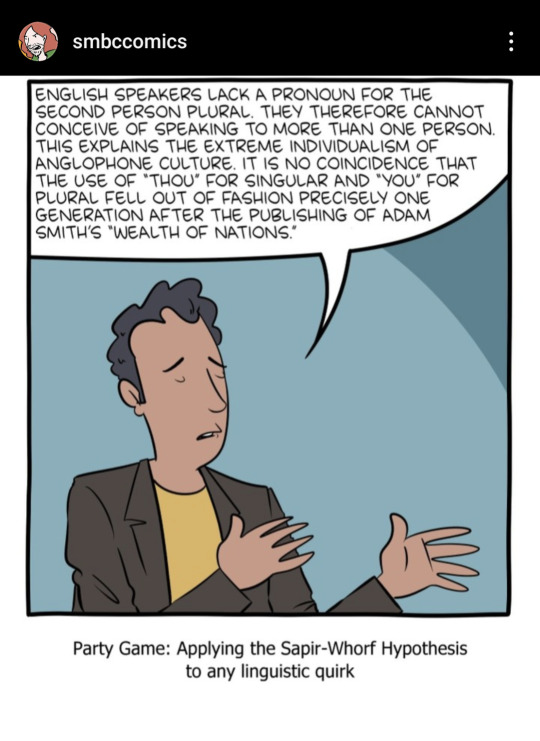
418 notes
·
View notes
Text
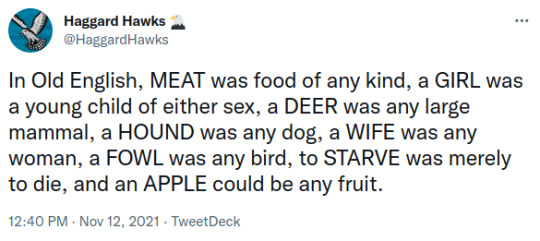
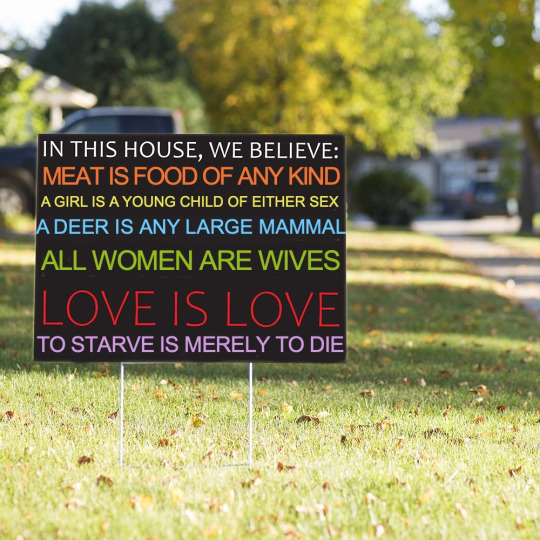

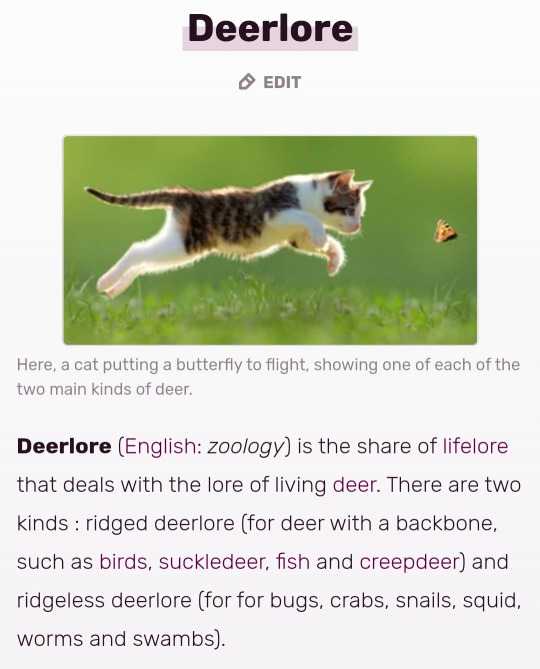
#anglish#deer#english#latin#old english#sorry in advance to aline if this is innacurate in the way pop linguistics often is
65K notes
·
View notes
Text

No isn't no
The English words no and no don't share a common ancestor. No, the opposite of yes, comes from Proto-West-Germanic *naiw ('never'), while no as in no pain, no gain comes from *nain ('not any'): it arose as a variant of none.
No as opposed to yes isn't related to German nein and Dutch nee either. Their only common part is n-, which comes from the Germanic negation particle *ne, also found in words such as not, neither and never.
Click my new graphic to learn all about no and no. A short article on my Patreon (440 words) tells you more about words related to the ones depicted on the left side, such as either, naught, and German immer ('always').
#historical linguistics#linguistics#language#etymology#english#dutch#german#low saxon#frisian#norwegian#icelandic#swedish#danish#lingblr#proto-germanic#proto-west germanic#old norse#old english#middle english
395 notes
·
View notes
Text
Fuck it. *lexicalizes your compounds*
894 notes
·
View notes
Text
THOU, THEE, THY, THINE. SAME THING RIGHT?
NO.
Although they seem very similar, Shakespeare would be in tears if he saw how most people mix them up. lets save William the misery and teach you when to correctly use thou, thy, and thine.
THOU
Thou = You (in subject form)
"Thou art killing me." "Art Thou crying?"
THEE
Thee = You (in object form)
"I want to kill thee." "My dog ate thee in my dream."
THY
Thy = Your (before a word that starts with a consonant)
"Thy mother." "Give me thy duck."
Thyself is used the same as any other thy+word combination like "thy mother" but without a space
"Take care of thyself."
THINE
Thine = Your (before a word that starts with a vowel)
"Thou art on thine own." "Thine answer hath satisfied mine query."
OR
Thine = Yours
“This is thine.” “The throne is thine, should thou choose to take it.”
(last 2 examples by @bookishwenchmeltha)
Now Shakespeare can truly rest in peace.

Go follow me @leisureflame for more posts like this!
#writing#shakespeare#language#old english#history#writing tips#writing recources#early modern english#thy#thine#thou#thee
969 notes
·
View notes